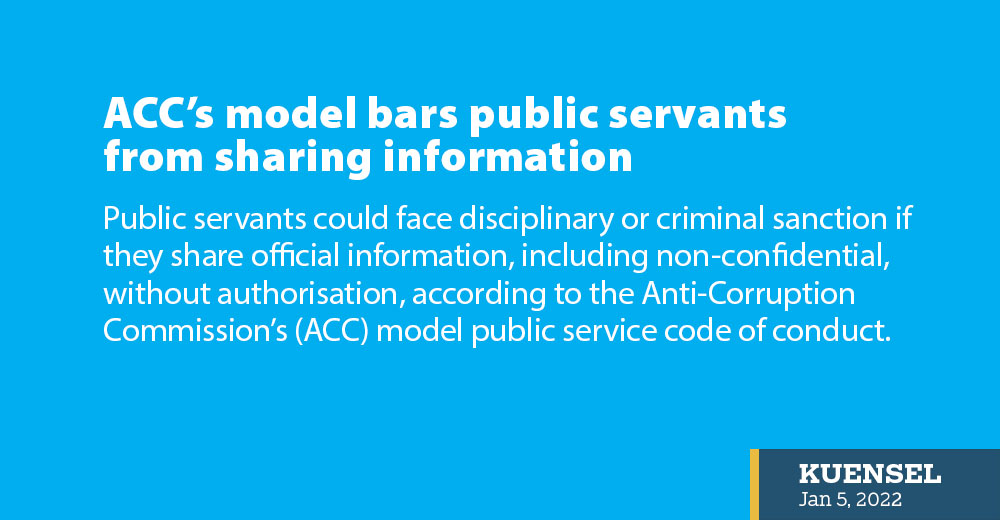… Model code of conduct will be applied as employment terms and conditions
Lhakpa Quendren
Public servants could face disciplinary or criminal sanction if they share official information, including non-confidential, without authorisation, according to the Anti-Corruption Commission’s (ACC) model public service code of conduct.
ACC on December 30 last year issued an executive order requiring public agencies to develop and implement an agency-specific code of conduct based on the commission’s model public service code of conduct.
It requires a public servant to maintain confidentiality and secrecy of any matter, document, report, and other information related to the official function that becomes known to them.
With this coming into force starting December 31 last year, media professionals say this worrying trend is violating the right to freedom of speech, opinion, and expression and the right to information enshrined in the Constitution.
The Bhutanese’s Editor-in-chief Tenzing Lamsang said that the model code should not stop public agencies and officials from sharing public information which the public requires. “Public information is for the public.”
“Be it any codes, regulations, or acts, if it is not in keeping with the constitution, it is null and void. All of these should not be ultra vires to the constitution,” he said.
“Right to the information is talking about not State secret, but it is about public information which is needed for the public,” he said, adding that the government should be sharing it since media works to advance the public interests.
Tenzing Lamsang said that this will also impede journalists to cover investigative stories against corruption. “If only authorised civil servants are allowed to talk, how they will expose corruption, at least to the media?”
Business Bhutan’s Managing Editor Kinley Yonten said that such red tape and formalities are unhealthy for democracy. “Media has a pivotal role that a democratic government ensures transparency, sincerity, and accountability.”
He added that strengthening free media will ultimately strengthen democracy and promote liberty. “If democracy allows people to determine their own future, that choice or determination must be based on factual and accurate information.”
“Perceptions and beliefs that are prevalent within a few agencies, which see media as a threat to their existence and interests, must also change if we are to ensure good governance and not just government,” he added.
A senior journalist said that the media will struggle to perform its duties. “With this kind of rule, we are not even facilitating media.”
He said that it would rather promote corruption, nepotism, and favouritism in the country with people disallowed to share information. “This indirectly means the system does not require media, and it is a really dangerous trend.”
The model code of conduct will be applied as employment terms and conditions of a public servant and the breach will result in disciplinary or criminal sanction as appropriate.
The implementation will be monitored and evaluated through the implementation of the organizational integrity plan derived from the national integrity and anti-corruption strategy.
The head or senior management in the agency is responsible for implementing the model code.
The ACC, as required by section 35 of the Anti-Corruption Act of Bhutan 2011, developed the model public service code of conduct and advised public agencies to adopt it.
The AAC, on the other hand, said that the model code of conduct is expected to inform the public on what they are entitled to expect in terms of the conduct of public servants. The model code sets out the standards of integrity and conducts that public servants are required to comply with and the procedures to help them meet the standards.
It is one of the core rule-based instruments and successful strategies used in the fight against corruption.


